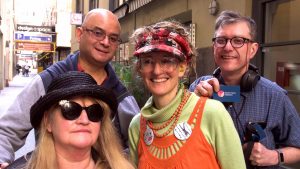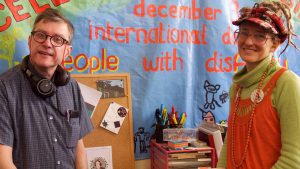 Brain Injury Matters (BIM) is a self advocacy and community education group for people living with an Acquired Brain Injury, (ABI). BIM organises events and identifies opportunities to assist self advocacy.
Brain Injury Matters (BIM) is a self advocacy and community education group for people living with an Acquired Brain Injury, (ABI). BIM organises events and identifies opportunities to assist self advocacy.
BIM aims to gather a collective voice of self advocacy to help people living with ABI to realise their own full potential for a flourishing life within a supportive community and to also increase community awareness about ABI.
Brain Injury Matters has as its principal objectives:
- To manage an organisation that is run effectively by and for people with an ABI.
- Raising awareness about effects of acquired brain injury through community education.
- Provide people with acquired brain injury a platform to inform local, state and national bodies around relevant issues.
We want people to join our group because:
We want people to join Brain Injury Matters because it brings us together to form an inclusive and creative community for people with an acquired brain injury.
BIM encourages our members to take initiative and leadership roles within an environment that is supportive.
Being a part BIM allows people to raise awareness about acquired brain injuries and to join with others that have been through the same thing.
There are opportunities within BIM to volunteer. Volunteering has proven to boost people’s self confidence and encourages them to move outside of their comfort zone.
BIM is a volunteer led and run organization which means that it is open to new people’s ideas and energy.
BIM is always striving towards creating a positive change(s) for our group and others within the ABI community. People’s role as a BIM member can also give them a sense of pride and identity.
 Our Issues
Our Issues
We are the only self advocacy group in Australia run by and for people with an acquired brain injury.
BIM organises events and identifies opportunities for self advocacy. BIM aims to help people with an ABI to realise their potential for a full life within a supportive community.
The issues BIM care about include:
BIM wants the world to be a better place for people with a disability.
Having an acquired brain Injury can be an ‘invisible disability’ which makes it difficult for people to understand. At BIM we raise awareness about acquired brain injuries and work towards making people more aware of the challenges of having an ABI.
Some of the other issues BIM cares about include:
- The need to empower people living with an ABI
- Providing avenues to alleviate isolation
- The increased prevalence of mental health concerns within the ABI community
- Lack of accessible information within the public transport system
- Many support providers do not recognise the complexities of ABI, so individuals are sometimes not funded at appropriate levels
- Lack of awareness and understanding of ABI in the broader community and amongst family and friends can lead to people feeling isolated and distressed.
Our Projects
Current Projects
- ABI Wise, App Project
What started life as a physical resource many years ago (Hitchhikers Guide to ABI), has been developed and expanded upon. The result is a user friendly and accessible phone application brimming with useful information and resources.
- Loddon Mallee ABI Social Media Training Project
This project was developed in partnership with Bendigo Health. We are developing a training resource for people with ABI to safely use social media in order to stay connected and reduce isolation.
Previous Projects
- Hitchhikers Guide to ABI
- Redevelopment of website and social media platforms
- International Day for People with Disabilities, events and presentations
- Brain Injury Awareness Day, events and presentations
- Dangerous Deeds which included making the video Out of Hiding
- Working on the Act Resources Guide to make the following videos
- Broke his Crown
- Sink or Swim
Our members are also involved in numerous other disability and advocacy organisations, and are involved in many exciting projects within the brain injury and disability community.
Self Advocacy Matters
- Self advocacy matters because it is about standing up for yourself and other people with disabilities.
- Self advocacy encourages self-awareness and helps you to feel positive to make changes.
- Self advocacy matters because it can help people to speak up, for themselves and others.
Why self advocacy groups matter:
Nothing about us without us is more than just a mantra. Self advocacy groups provide a crucial and unmatched perspective that is absolutely necessary to the health and wellbeing of our communities.
Self advocacy groups are incredibly important to people in the ABI community and people with disabilities generally. This is because they offer people an opportunity to speak up for what’s important to them and other people living with the same or similar disabilities.
In a society that is ableist, self advocacy groups are integral to ensuring that people with disabilities are treated equally and with respect.
Quotes
“After my strokes in 2011and 12, I felt completely alone and pretty crazy. I came to BIM in early 2014 and I immediately knew that I’d found my tribe.
BIM to me has been invaluable, they showed me that I’m not alone, the brain injury community is vast and incredible. They gave me hope and strength,
I don’t know where I’d be if I hadn’t found BIM.”
– Ann Hutchinson
“I have been a member of BIM for more than 15 years. I believe that my journey of learning to live with and celebrate my life with ABI, has been made possible by working with and hearing the stories of others with ABI. And being part of a collective community such as a self advocacy group like BIM can not only help heal our traumas and make sense of our new worlds, but self advocacy groups can also give us tools and a voice to advocate for a more fair and just society. Together we can work to make our own lives with ABI better, but we can also work to make the Iives of people with other and future brain injuries better too. “
– Larissa MacFarlane
Group Information
*Become a member and be updated with ways you can be involved!
Meeting Times
We hold meetings every 2nd Tuesday of the month.
Meeting: 11:00am-1:00pm
Meeting Locations
- Ross House,
247 Flinders Lane,
Melbourne 300
